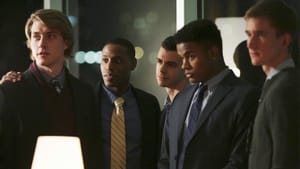Stay in the Loop
BSR publishes on a weekly schedule, with an email newsletter every Wednesday and Thursday morning. There’s no paywall, and subscribing is always free.
Too many shades of gray
John Ridley's 'American Crime,' season two

According to the endless self-aggrandizing chatter of my TV’s OnDemand function, America’s favorite winter sport is not skiing, watching college basketball, or even dreaming of the Eagles signing Peyton Manning for a glorious last season guiding our beloved football team. It is, instead, binge-watching TV shows, principally the modern six to 16-show vehicles that now seem more like extended big studio films than TV shows. A principal contender for our attention this winter is creator John Ridley’s second season of American Crime, a program that presents an extended look at a single alleged crime and its repercussions.
The successful first season of the show opened ABC’s eyes about the public’s willingness to watch a show more sophisticated than the average hour-long police procedural. The show and its actors garnered many award nominations and several wins, and Ridley has brought back several actors from season one. This season, though, is placed in a different locale (Indianapolis), and the crime (or is it?) is a bit quieter than season one’s home invasion, murder, and rape. This season the principal crime victim survives; he is Taylor Blaine, a boy who depends on a scholarship to attend the exclusive Leyland Academy, where he is something of an outsider.
Pictures of Taylor (Connor Jessup) in his underwear, apparently drunk or drugged, start showing up on his classmates’ smartphones, and the school, headed up by Leslie Graham (Felicity Huffman), quickly suspends him for conduct outside their “code.” Their problem is that the victim sort of tells his mother, Anne (Lili Taylor) — most reluctantly — that he was sexually assaulted. He never quite says the r-word, instead mumbling things like “Something happened.” The pictures were taken at the basketball team’s “captain’s party,” and Anne first takes the accusation to Graham, then to the police.
It’s not that simple, though. It emerges than Taylor has been wrestling with same-sex impulses, and the victim and his “attacker,” Eric Tanner (Joey Pollari), exchanged fairly explicit fantasy messages — electronically, of course — about rough sex. Along the way, Eric’s co-captain, Kevin LaCroix (Trevor Jackson), is tarred by the scandal. This greatly upsets Kevin’s parents (Regina King and Andre Benjamin), a well-to-do and driven African-American couple. Eric Tanner’s parents, by contrast, are white, less well off, and in the process of divorcing.
A complex group portrait
Also dragged into in this mess is Dan Sullivan (Timothy Hutton), Leyland’s successful basketball coach. The involvement of other characters adds complex depth to a group portrait in many shades of gray. Sullivan’s wife, Steph (Hope Davis), for example, has a fascinating discussion with her daughter Becca (Sky Azure Van Vliet) about what might be called the Catholic notion of bad thoughts as actual sins. Becca grunts a disagreement that such an idea even deserves consideration.
The production is not flawless. Perhaps the principal problem is the affection of Ridley’s team of directors for the extreme close-up, as though every facial twitch is deeply meaningful. This becomes annoying, if not in the extreme. Also, an Atlantic reviewer last month decided after a few episodes that the program tends to be “academic and inert,” that perhaps fully drawing most of the characters “carefully and thoughtfully” undercuts the “thrill” crime drama viewers want.
However, well into the story there are still intelligent questions to be answered: Can a teenager struggling with his sexual orientation and rough sex fantasies actually be raped, and is there any hope of establishing that legally? Or is Taylor an odd variation of the Victorian heroine who dreams of being ravished, but then decides that wasn’t such a good idea after the fact? Also, what will come of the confrontation (promised by the coming attractions trailer) between Kevin LaCroix’s mother (King no doubt in her best firebrand mode) and the victim’s mother? How does a conversation go between a wealthy African-American mother with a fierce devotion to her son’s reputation and a poorer white woman whose son may have well have endured an actual physical assault? If you’re a TV binge-watcher, American Crime 2.0 is pretty good choice.
For the author’s review of season one, click here.
What, When, Where
American Crime. Created by John Ridley. ABC TV, Wednesdays at 10pm ET.
Sign up for our newsletter
All of the week's new articles, all in one place. Sign up for the free weekly BSR newsletters, and don't miss a conversation.

 Rick Soisson
Rick Soisson